The Coen Brothers’ Miller’s Crossing (1990):
Criterion Blu-ray review
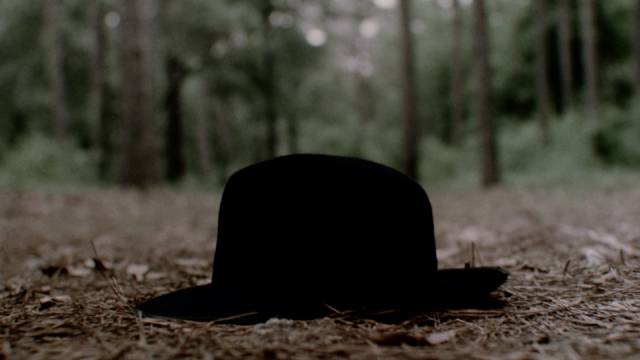
I wrote a review of the Coen Brothers’ third feature, Miller’s Crossing (1990), soon after it was first released. I loved this dense, richly textured homage to the classic gangster movie at the centre of which is an enigma. The plot is complex and endlessly twisty as it revolves around a character who expresses almost nothing – he keeps his feelings so tamped down that we can never be sure why he does what he does, or even at times just what it is that he’s doing. For me, everything abruptly came into focus with the film’s final shot; it suddenly all made sense. I sent that review to Film Quarterly and in due time received a polite and thoughtful rejection, the gist of which was that finding such a “key” is a dubious critical step, that it’s unreliable and reductive.
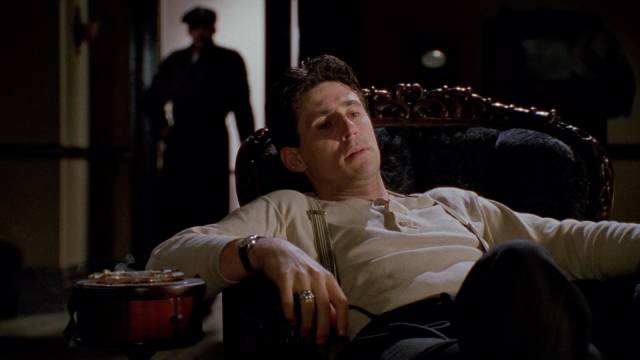
And yet, thirty-odd years later – and almost two decades since I last watched Miller’s Crossing (on DVD) – I find it happening all over again. I can follow the story’s events more easily because I’ve been here before, but that final shot still tells me something which clarifies (and in a sense “explains”) what has happened. This is the opposite of that final shot in Citizen Kane (1941) which purports to “explain” the life and personality of Charles Foster Kane, but explains nothing and makes a joke of the quest to understand the man. Should I distrust my own intuition? I haven’t come across other reviews which offer the same interpretation, so perhaps my own mind, emerging from the Coens’ feverish tragicomedy, has invented this apparent insight out of thin air. But then composer Carter Burwell, in an interview on Criterion’s new Blu-ray, makes a comment about his approach to the score which suggests he saw exactly what I see…
There’s no way to dig into this without talking about specifics of the film’s plot and themes which might be considered spoilers, so reader beware.
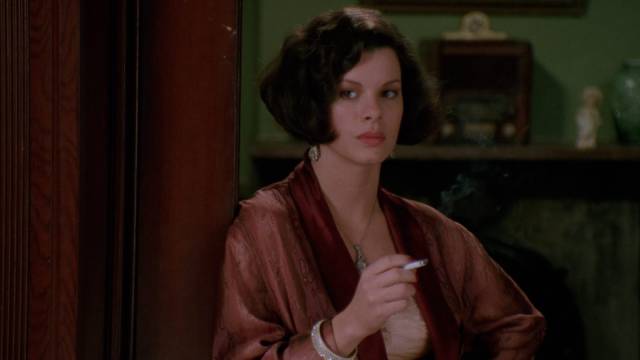
Miller’s Crossing marked a major development in the Coen Brothers’ filmmaking. Their first feature, Blood Simple (1984), was a tight, ferocious, low-budget neo-noir which channelled Jim Thompson better than any actual adaptation of his novels. Their follow-up, Raising Arizona (1987), was a broadly comic mash-up of genres barely held together by a screwball plot. But Miller’s Crossing is bigger, evoking golden age studio movies rather than the independent fringe. Although it is still playing with genre, it has formal qualities which give it an elegance absent from the earlier, scrappier movies. In a way, this makes it harder to read, because beneath the elegance there is still a feeling of comic irreverence. Are the Coens’ mocking the classic gangster genre, or embracing it and repurposing its tropes, deconstructing something familiar to reveal or create something new?
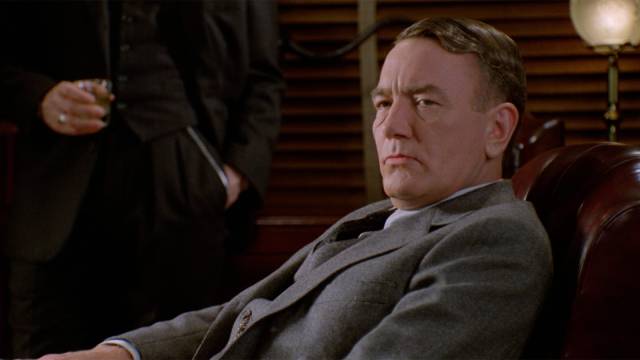
The brothers say that their script owes a lot to the stories of Dashiel Hammett, both in terms of the narrative itself and in the manner of its telling; they avoid providing interior information. We only know the characters through their words and actions, neither of which give the audience a reliable idea of what is happening. In this tale of gangsters and gang war, of political corruption and the intersection of individual self-interest and social conflict, as viewers we react to seemingly familiar incidents without necessarily knowing what the actual motives behind them are.
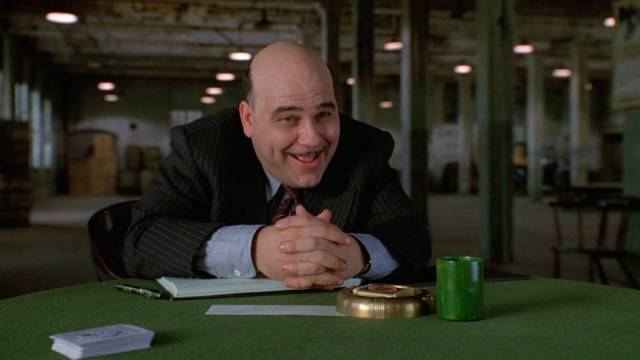
The characters talk about, and are perpetually concerned with, loyalty. These gangsters have a code which supposedly defines their behaviour, but being flawed people their reality fails to live up to their ideals. In the opening scene (which echoes the beginning of The Godfather [1972]), Italian boss Johnny Caspar (Jon Polito) petitions the more powerful Irish boss Leo O’Bannon (Albert Finney) for redress of a perceived wrong. Caspar keeps returning to the issue of ethics as he explains that Bernie Bernbaum (John Turturro) has been interfering with Caspar’s betting on fixed fights, cutting into his take. But Bernie is under Leo’s protection because the latter is romantically involved with Bernie’s sister Verna (Marcia Gay Harden). He refuses to sanction Bernie’s death, thus initiating fractures in the uneasy balance of power between the gangs.
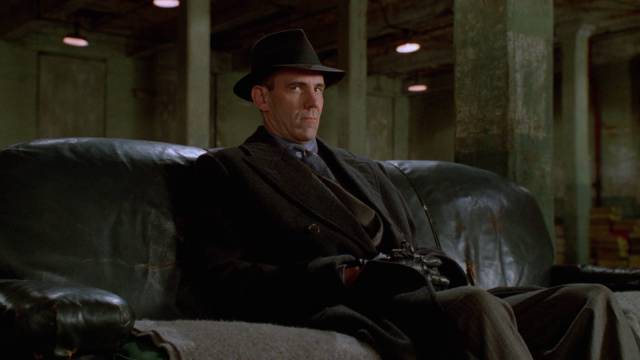
Leo’s adviser and fixer Tom Reagan (Gabriel Byrne) tells him he should give Bernie up in order to maintain the peace, but Leo puts his personal loyalty before the code. The path to a war between the Italians and the Irish is set. Things are further complicated by the fact that Tom is also having an affair with Verna, a betrayal of the boss to whom he otherwise shows unwavering loyalty. Once someone ends up dead – Leo’s man Rug Daniels (Salvatore H. Tornabene) bumped off in an alley – the violence escalates, with Tom caught in the middle. It all gets very complicated before Leo’s enemies are defeated and we see that Tom has played the gangs against one another like Toshiro Mifune in Yojimbo (1961).
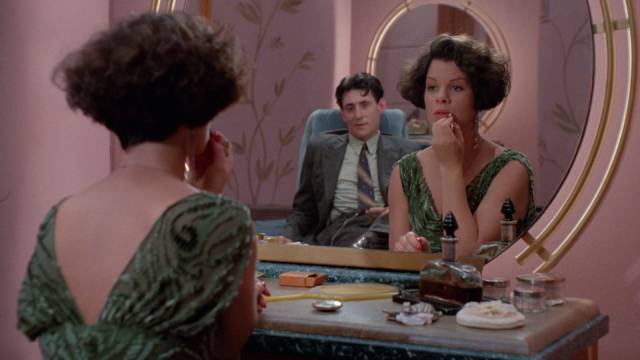
Underlying the mechanics of the gang war is a depiction of male fragility, all the rules, the code, the “ethics” existing in order to protect the egos of these gangsters. Visually, one of the symbols used to increasingly comic effect is hats – they come off, they’re pulled down low over the eyes, they’re grabbed by the wind. Caspar, perpetually concerned with his own status, is always suspicious that everyone else is “giving him the high hat”, asserting their dominance, putting him down. These suspicions provoke him to violence, striking out to reassert his masculine authority. These hats act as both shields and containers, protecting their wearers from insult while simultaneously holding in volatile, destabilizing emotions. (The Coens, however, insist that “a hat is just a hat”.)
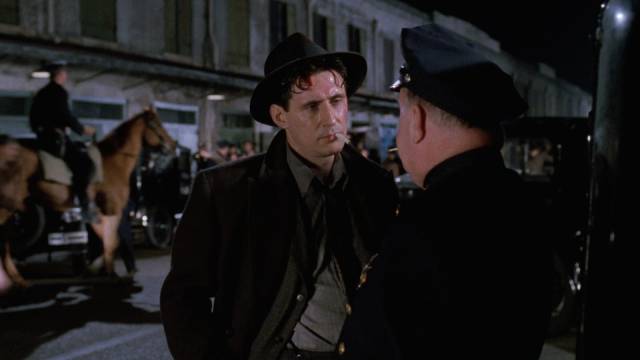
Issues of masculinity shape the characters’ personal as well as “professional” lives – Tom’s betrayal of Leo with Verna causes a seemingly irrevocable rift, although it eventually leads to the destruction of Caspar’s gang and the restoration of Leo’s position as the man who runs the town. Their emotional triangle is reflected in a second triangle, one involving three men which is key to unravelling the web of conflicts tearing the town apart: Caspar’s lieutenant, the Dane (J.E. Freeman), is involved with Mink (Steve Buscemi), who in turn has something going with Bernie. This triad needs to be destroyed before stability is regained, but it points towards that revelation which I see in the film’s final moments.
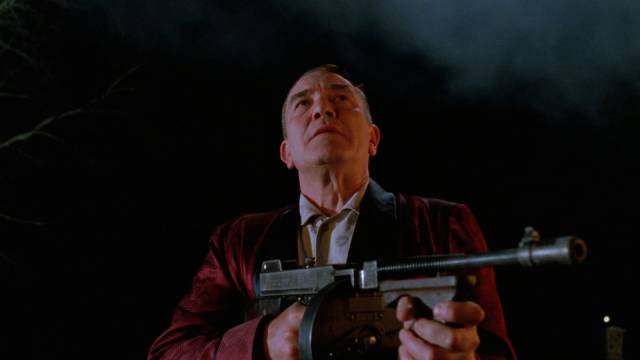
At the funeral for Bernie (whose death at the start might have spared everyone all the subsequent conflict and violence), Leo tells Tom that he’s going to marry Verna and as they walk away from him, Tom watches them go, pushes his hat down hard over his forehead as if clamping a lid on his own feelings – and the camera dollies in as he tilts his head and his eyes stare out from under the brim, weighted with what appears to be a deep sense of loss and melancholy. But it’s not Verna he’s lost; it’s Leo. It seems that all he’s done, all the plotting and manoeuvring to save Leo from his own poor decisions, has been done out of an unexpressed, unrequited love.
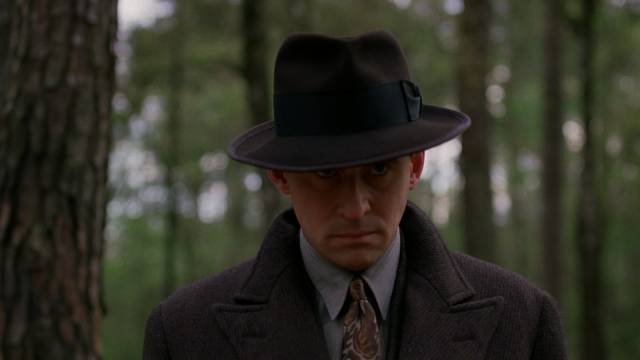
Everything Tom has done to manipulate and guide the action makes sense and takes on a sense of agency when seen in this light. That final look in Tom’s eyes carries the weight of the film, the cost to himself of all he’s done for the object of his desire which has nonetheless been irrevocably lost to him as a consequence of his actions. And yet … if you search “Miller’s Crossing gay subtext” you get a lot of hits referring to the Dane-Mink-Bernie triad, but little or nothing mentioning Tom. The Coens have mentioned in interviews the mirroring of the gay triangle and the heterosexual triangle (Tom-Verna-Leo), but the question of why Tom would risk so much to have a relationship with his boss’s mistress, a woman he actually doesn’t seem to have any particular feelings for, isn’t addressed. Could it simply be that Verna is the closest he can come to having a physical relationship with Leo? Not to mention her unfaithfulness with him seems likely to provoke rejection from Leo, thus removing Tom’s “rival”.
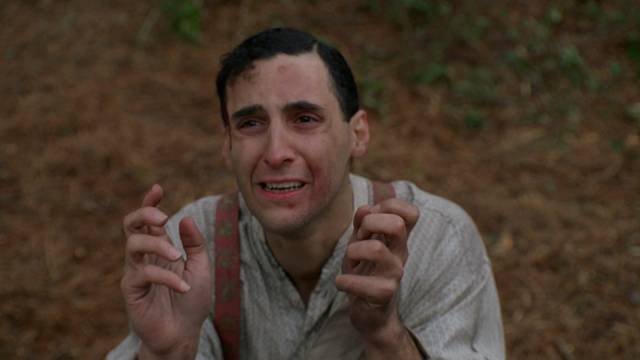
Although nowhere in the disk extras is any of this acknowledged by the Coens or the actors, Carter Burwell mentions that as he was trying to find the musical tone he needed for the score, he settled on the idea that this was a romance between Tom and Leo, an idea which unsettled the Coens until they actually heard the score. Woven through the Irish airs, which could so easily have seemed parodic, is a thread of romantic melancholy which works perfectly with the sombre visuals and the generally understated performances (Polito and Turturro are the big exceptions, the former going large to compensate for suspicions of inadequacy, the latter as an expression of absolute self-confidence which is toxic) to give the film its distinctive tone – neither parody nor pastiche, but rather a romantic tragicomedy which uses the tropes of the gangster movie to explore a particular type of masculinity.
*
The disk
Miller’s Crossing poses some problems for a digital transfer – much of it takes place in underlit interiors and night exteriors, and the colour palette is predominantly muted greens and browns, giving it a slightly oppressive, murky look. The notes on the release say that this is a 2K transfer from the original negative, but it doesn’t specify when and how the transfer was made. It actually looks very similar to the 2011 Fox Blu-ray release, rather than a brand new transfer. The audio is fine, giving clarity to the thickly-accented dialogue and Burwell’s haunting score.
One thing not noted anywhere on the release is that, as with an earlier release of Blood Simple, the Coens have tinkered with the editing. This version runs some two minutes shorter than the theatrical version seen on previous disks. I’m not sure what all these trims consist of – the only one I really noticed was the deletion of Frankie (Mike Starr)’s perplexed verbal response when Tom hits him over the head with a chair (”Jesus, Tom”) before leaving the room to get help with beating Tom up. It doesn’t much alter the scene, but does eliminate a tiny character detail. The temptation filmmakers have to keep tinkering with their work is understandable – and this certainly doesn’t rise to the level of George Lucas’s butchery of THX 1138 and the original Star Wars – but it would be appreciated if they could be open about it.
The supplements
Apart from a featurette cut from interviews recorded at the time of release (13:49), the disk includes almost two hours of new interviews and conversations. Writer Megan Abbott discusses with Joel and Ethan Coen the influence of noir – films, but more extensively novels – on the movie (28:44), and with Byrne and Turturro the characters and how the actors worked with the Coens to create them (32:23). Barry Sonnenfeld talks about achieving the film’s elegant look (15:12), Dennis Gassner discusses the design and New Orleans locations (10:02), and composer Carter Burwell and music editor Todd Kasow talk about the use of music in Coen Brothers movies (16:41).
The booklet essay is by critic Glenn Kenny.
Altogether, it’s an interesting package which gives this early Coen masterpiece its due.
Comments
There’s actually a lot more that’s been cut or altered in this Criterion release. The line, “Take care, now” by Lazar’s main henchman was removed and dozens of minor changes to the pacing and cutaways, too, many of them presented here: https://www.movie-censorship.com/report.php?ID=111233
I try not to be an absolute purist, as a lot of filmmakers want to tinker with their work after it’s been released … but it would be nice if they at least made a statement about the changes; even better, make the original version available. The Coens did something similar with Blood Simple. And of course, there are five different cuts of Blade Runner, all readily available, and all with a clear explanation of their provenance. Also, years ago, Peter Weir made a director’s cut of Picnic at Hanging Rock, which is shorter than the theatrical release … but again, both versions are available … It’s not the tinkering that bugs me, just the disappearance of the version we all saw originally in the theatre.